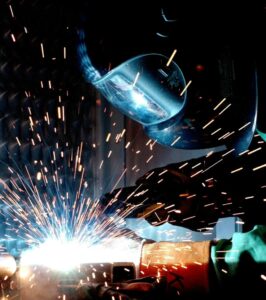MIG Gas: The Lifeline of Quality Welding
Gas metal arc welding (GMAW), commonly known as MIG (Metal Inert Gas) welding, is a process that forms a bond between metals by using electricity to melt and fuse them. A critical component of the MIG welding process is the mig gas, which not only protects the weld area from environmental pollutants but also greatly influences the quality of the weld.
The Role of MIG Gas in Welding
MIG gas serves as a shield to protect the molten metal from impurities present in the atmosphere. Without the presence of this protective gas, the weld could suffer from oxidation, contamination, and porosity, which compromise its strength and appearance. Thus, the choice of gas is fundamental to achieving a well-formed and aesthetically pleasing weld joint.
The most common gases used in MIG welding are Argon and Carbon Dioxide (CO2), either as pure gases or as a mix, depending on the material being welded and the desired properties of the final weld. Professional welders may require different mixtures to match specific welding tasks, which highlights the versatility of MIG welding—one aspect that has contributed to its widespread use in the industry.
How MIG Gas Influences Weld Quality
The selection of an appropriate mig gas blend is vital for ensuring high-quality welds. A blend with a higher Argon content will typically provide a smoother arc, less spatter, and a more aesthetic bead profile, suitable for welding thin materials and stainless steel. In contrast, adding CO2 into the mix can provide deeper penetration, which is suitable for thicker materials.
The impact of the MIG gas does not end at the finished weld’s appearance or structural integrity; it also plays a role in welding speed and efficiency. A proper gas mixture can improve the speed of welding, reducing the overall time and cost of the project. Furthermore, the correct selection and management of MIG gas can reduce post-weld cleanup by minimising spatter.
Cost and Consumption Considerations
While MIG gas is indispensable for welding, it also comes at a financial cost. It is important for businesses and individual welders to balance the expense of the gas with the efficiency and quality it provides. Wastage can be avoided by using proper gas flow rates and by employing gas-saving technologies like regulated flow meters.
In addition to cost-awareness, safety is paramount when handling and storing MIG gases. Users should always follow the correct procedures for gas cylinder storage, transport, and operation to prevent accidents and ensure consistent weld quality.
MIG Gas and Environmental Impact
Beyond the immediate environment of the weld, MIG gas usage has a broader environmental impact. As businesses and industries strive for sustainable operations, the selection of MIG gases can contribute to these goals. The industry is leaning towards gas blends that have less impact on the environment without compromising the welding’s quality and output.
The Importance of Gas Purity
Gas purity is another key factor in welding processes. Impure gases can cause a raft of welding issues, such as porosity, which weakens the weld. High-quality, pure gases ensure consistent and reliable welding results, which is why professional welders rely on trusted gas suppliers that can guarantee the purity of their products.
Latest Advances in MIG Gas Technology
The welding industry constantly evolves, with advances in technology improving the quality, speed, and safety of MIG welding. Automated welding setups and precision gas delivery systems are examples of how the field is advancing and helping welders increase productivity while maintaining or even enhancing the quality of their welds.
New gas mixtures are also being developed to cater to new materials and welding techniques, ensuring that welders have access to the best possible resources. Innovations in cylinder technology are also making the transportation and storage of MIG gases more efficient and secure.
Choosing the Right MIG Gas
Making the right choice in MIG gas often requires consideration of several variables, including the compatibility with the base material, the welding position, the power of the welding equipment, and the desired outcome for the finished weld. Experienced welders become adept at altering their gas mixtures to suit each unique scenario, demonstrating the artistry that goes hand-in-hand with the science of MIG welding.
For those new to MIG welding or looking to refine their practice, consulting with a gas supplier knowledgeable about the specifics of welding gases can be invaluable. Engaging with experts provides insights into making the optimal choice in MIG gas for any welding challenge.
MIG Gas Accessibility
Accessibility to the right MIG gas is as important as the gas itself. Suppliers, like Core Gas, ensure a steady supply of gases, with a range of options to suit different needs. Welders should investigate local suppliers, looking for those who can deliver on quality and reliability to support their welding activities consistently.
Conclusion
MIG gas serves as a foundation for successful MIG welding, influencing the measureable qualities of each weld—structural integrity, appearance, speed, and cost—and helping to determine the overall success of a welding project. While the specific choice of mig gas will depend on individual project requirements, understanding its role and selecting a high-quality supplier remain at the heart of quality MIG welding practices.
As an essential component in the welding industry, MIG gas will continue to evolve, along with technology and environmental considerations, to meet the challenges of modern fabrication and manufacturing. For those in the industry, keeping abreast of advancements and maintaining a dialogue with trusted suppliers is the lifeline of not just their welds, but their business as a whole.


